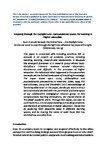Stepping through the daylight gate:compassionate spaces for learning in higher education
| dc.contributor.author | Haynes, JE | |
| dc.contributor.author | MacLeod-Johnstone, E | |
| dc.date.accessioned | 2017-10-06T11:59:00Z | |
| dc.date.available | 2017-10-06T11:59:00Z | |
| dc.date.issued | 2017-09 | |
| dc.identifier.issn | 0264-3944 | |
| dc.identifier.issn | 1468-0122 | |
| dc.identifier.uri | http://hdl.handle.net/10026.1/10023 | |
| dc.description.abstract |
This paper is concerned with troubling emotions felt or aroused in all aspects of academic practice, including teaching, learning, research and relationships. It discusses the emergent processes of a research group whose multidisciplinary interests coalesce around discomfort, disturbance and difficulty in the processes of higher education. We talk about what happened in the space when we explored the liminal landscapes of troubling knowledge. The paper draws upon social, philosophical and psychodynamic perspectives on emotions and an epistemology of implicit understanding and affect. In this paper, we discuss ways in which we created and worked with the permissive and loose space of our collaborative pedagogical research group. In this compassionate learning atmosphere, we shared stories of ‘troubled’ academic work. Through this paper, we seek to contribute to a critical understanding of troubling emotions and the work of compassion in higher education. We do this by exploring their educative value in different learning spaces, and by sharing the sense of quiet hope that has enriched our everyday lives. | |
| dc.format.extent | 179-191 | |
| dc.language | en | |
| dc.language.iso | en | |
| dc.publisher | Taylor & Francis (Routledge) | |
| dc.subject | Dangerous knowledge | |
| dc.subject | liminality | |
| dc.subject | affect | |
| dc.subject | compassion | |
| dc.subject | implicit understanding | |
| dc.title | Stepping through the daylight gate:compassionate spaces for learning in higher education | |
| dc.type | journal-article | |
| dc.type | Article | |
| plymouth.issue | 3 | |
| plymouth.volume | 35 | |
| plymouth.publication-status | Published | |
| plymouth.journal | Pastoral Care in Education | |
| dc.identifier.doi | 10.1080/02643944.2017.1364529 | |
| plymouth.organisational-group | /Plymouth | |
| plymouth.organisational-group | /Plymouth/Faculty of Arts, Humanities and Business | |
| plymouth.organisational-group | /Plymouth/Faculty of Arts, Humanities and Business/Plymouth Institute of Education | |
| plymouth.organisational-group | /Plymouth/REF 2021 Researchers by UoA | |
| plymouth.organisational-group | /Plymouth/REF 2021 Researchers by UoA/UoA23 Education | |
| plymouth.organisational-group | /Plymouth/Research Groups | |
| plymouth.organisational-group | /Plymouth/Research Groups/Institute of Health and Community | |
| plymouth.organisational-group | /Plymouth/Users by role | |
| plymouth.organisational-group | /Plymouth/Users by role/Academics | |
| dcterms.dateAccepted | 2017-07-24 | |
| dc.rights.embargodate | 2019-3-1 | |
| dc.identifier.eissn | 1468-0122 | |
| dc.rights.embargoperiod | Not known | |
| rioxxterms.versionofrecord | 10.1080/02643944.2017.1364529 | |
| rioxxterms.licenseref.uri | http://www.rioxx.net/licenses/all-rights-reserved | |
| rioxxterms.licenseref.startdate | 2017-09 | |
| rioxxterms.type | Journal Article/Review |


